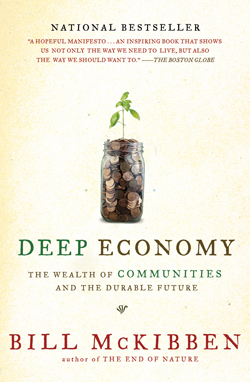 Bill McKibben’s book Deep Economy: The Wealth of Communities and the Durable Future offers a thought-provoking introduction to the problems with the global growth economy and to some possible small-scale solutions.
Bill McKibben’s book Deep Economy: The Wealth of Communities and the Durable Future offers a thought-provoking introduction to the problems with the global growth economy and to some possible small-scale solutions.
I got this book from the library in an attempt to understand the larger context for my ethical/environmental/economic concerns; I also obtained my own copy (the paperback list price is $15, but used copies are widely available, and I got mine free from PaperbackSwap.com) so that I could share it with neighbors and guests.
In Deep Economy McKibben, a longtime freelance author, journalist and environmentalist, outlines three fundamental problems with our society’s devotion to economic growth:
- it creates increasing inequality,
- it depletes essential natural resources and generates toxic wastes, and…
- it does not make us happy.
I have read numerous other books which address any one of these challenges. McKibben is one of the few authors (I would add Wendell Berry, Jerry Mander and Barbara Kingsolver) who addresses the three together. He backs his arguments with wide-ranging historical, sociological and scientific research, and he goes on to propose solutions.
At present McKibben’s energy is focused on 350.org’s attempts to change large-scale policy to mitigate climate change. Deep Economy, which came out in 2007, also warns of the dangers of climate change, but it emphasizes small-scale changes made by individuals and communities.
He writes that “changes in our sense of what we want from the world will be at least as important as changes in the tax code, and at least as hard to achieve…” and suggests that, when we slow down and detach ourselves from the commercial and political sales pitches which beset us, what we really want from the world is meaningful work and mindful connection with other people and with nature. Communities which focus on this desire will consume less, share more, make and do more for themselves, take more quiet time to savor what they already have.
Members of such communities will take to get to know their places and their neighbors and will base their actions on what they learn. Deep Economy describes many such mindful communities around the world. It doesn’t offer actionable information in the sense of giving step-by-step instructions which can be followed anywhere. It does offer key questions to ask and many examples which illustrate the possibility and complexity of positive change.
I found the book’s blend of studies and statistics, sweeping overviews, personal anecdotes and closely observed case studies clear, engaging and easy to read. I made copious notes as I read; the book’s format does not make it easy to find favorite passages again, although the index helps if you’re trying to find a particular case study and can remember the names involved.
Deep Economy is not a handbook which will give you the information you need to grow your own food, organize your community around an issue or get to know your neighbors better. It is an introduction to human-scale economics and a reminder of the larger issues surrounding our individual efforts toward community and self-sufficiency.
I recommend this book to anyone who is beginning to feel dissatisfied with the current political dialogue, who is conscious of a hunger for community and competence, or who struggles to explain this hunger and dissatisfaction to others and to articulate the possibility of a saner, more fully human way of living.
By Joanna Hoyt, Walden Labs contributor.


